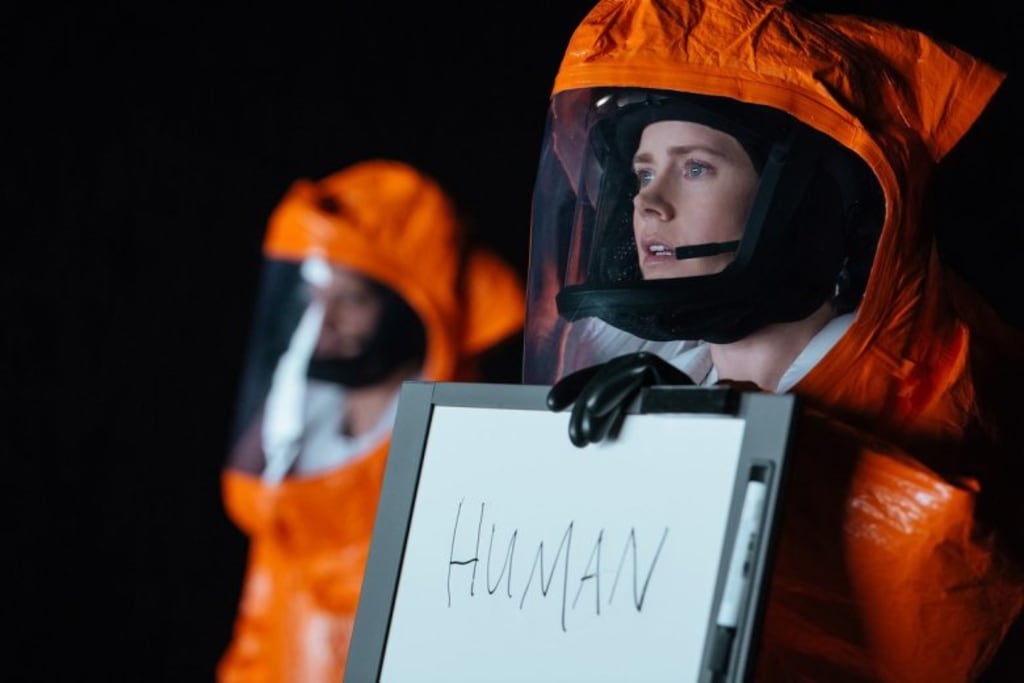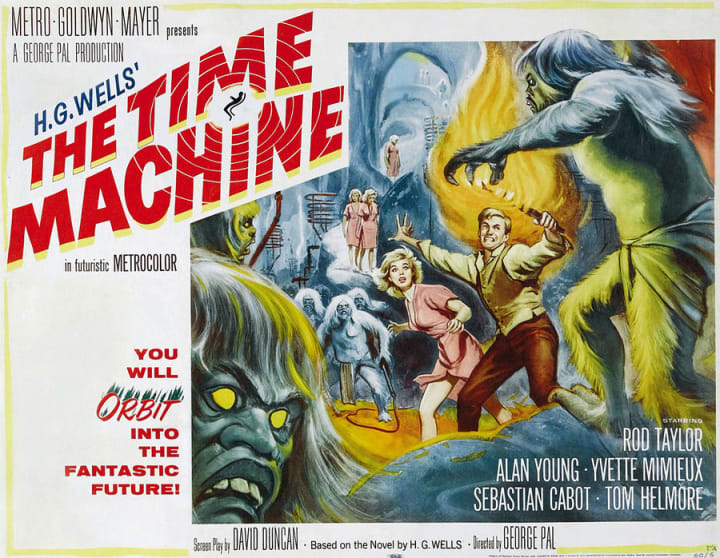Mental Time Travel: Is the Plot of Arrival Coherent?
WARNING: CLOSED CAUSAL CHAINS. Also spoilers.

Time travel is a bit of a trope in sci fi. The device has been used in literature since ancient times, with Hindu mythology portraying people going far into the future. This kind of travel isn’t logically impossible – in fact, with Einstein’s discovery of relativity, we must accept this discrepancy between personal and external time as a necessary feature of reality. The faster an object travels, the slower its time moves: ISS astronauts returning from missions have aged slightly less than had they remained on earth (due to different accelerations).
However, backwards time travel is a bit more difficult. This phenomenon was first dreamed up by Samuel Madden in Memoirs of the Twentieth Century (1733), in which an angel carries letters from 1997 to the past. It’s a great plot device, and has been used again and again in science fiction, in works such as H. G. Well’s The Time Machine and Asimov’s The End of Eternity. It even pops up in other genres (for example, The Time Traveller’s Wife). In film, backwards time travel has an illustrious history, with blockbuster appearances in the Terminator franchise, Back to the Future, and the excellent Edge of Tomorrow, as well as more avant-garde offerings (such as Twelve Monkeys and Primer). Arrival is the latest film to use this trope, but it does so in a fairly subtle way.

Despite its popularity, backwards time travel is highly contentious. Many regard it as impossible: the common-sense understanding of time (as a linear, uni-directional stream) seems to prohibit backwards movement. This question has generated a whole field of philosophy, with articles on the subject published in serious academic journals. In this piece, I want to argue the case for Arrival’s plot: although at face-value the circular narrative might seem incoherent, from a philosophical perspective it is entirely possible (at least in a logical sense). This’ll be a long one, so strap in - things are gonna get metaphysical.
First off, let’s give a brief plot summary. If you haven’t seen the movie, stop reading here: it’s one of the best sci fi films in recent years, so don’t let me spoil it for you!
Linguist Louise Banks (Amy Adams) appears to be suffering from grief at the death of her daughter and a presumed divorce. When giant alien spaceships (piloted by ‘heptapods’) arrive on earth, the US military calls on her to ‘learn their language’. Helped by physicist Ian Donnelly (Jeremy Renner), she begins to decode their messages, conveyed in a strange, circular script. Invoking the Sapir-Wharf Hypothesis, they hypothesise that, as the language used changes (even generates) thought, perhaps the heptapods think in a circular manner. Perhaps, by learning the aliens’ language, humans might be able to think like them. As international tensions escalate, amid fears that the heptapods plan to invade, the human forces prepare to attack. Louise is given the heptapod language in its entirety, which then changes her mind so she can perceive time as ‘circular’. On travelling inside the heptapod ship, she is told that humans will help the heptapods 3000 years in the future, which is why they have come to earth – so that they can give the humans their language, and thus a circular understanding of time. She calls the Chinese General Shang, and tells him not to attack the heptapods’ ship. She persuades him by speaking his wife’s death-bed words, which he will speak to her – in the future. The attack is called off, and the heptapods fly peacefully away. Ian declares his love for Louise, and the audience realises that the memories of the dead daughter come from the future – Louise will marry Ian, they will have a daughter, who will then die from an incurable disease.
So where’s the backwards time travel? Nobody physically moves through time, but that’s not all it takes. The issue here is not one of movement, but of causation. Let’s say we have two events, E1 and E2. They occur at times T1 and T2 – let’s say 2pm and 5pm respectively. In this example, E1 is an action – I put a bottle of water in the freezer. E2 is the result – the bottle of water breaks. My putting the bottle in the freezer at 2pm caused the bottle to break at 5pm – although, of course, the cause-effect pairing is mediated by a more complex causal chain: the water gets colder, this causes a chemical change (the water freezes into ice), the volume inside the bottle expands, this puts pressure on the glass of the bottle, the bottle shatters.
Our ordinary, common-sense idea of causation is uni-directional – in any cause-effect pairing, the cause must come first. Most of our scientific knowledge and technological achievements rely on this very basic assumption. However, in Arrival, the causal direction is reversed – we have a number of cause-effect pairings in which the cause comes after the effect. I’ll list the main ones here:
- Save the Aliens: Humans help the heptapods in the year ~5016 (T2). The present-day heptapods become aware of this (as they perceive time in a circular fashion – they have memories from the future (as with Louise’s memories of her daughter’s death). So they come to earth to give humanity their language (T1). The human’s help at T2 caused the arrival at T1.
- Dead Daughter: Louise’s daughter dies in the near-future (T2). These memories make her feel sad in the present (T1).
- Dying Wife: In the near-future (T2) General Shah tells Louise his wife’s death-bed words. She remembers this in the present (T1), and is able to say them to Shah to prevent the attack on the heptapods. This is possibly the best example of backwards causation in Arrival – the only way Louise could know those words was because Shah said them to her – in the future.
If you’re unhappy thinking in terms of backwards causation, we can also speak of the backwards time-travel of information – although no physical substance moves backwards, the information (Shah’s wife’s words; the knowledge of the daughter’s death; the knowledge of humanity’s helpful actions) does travel back from the future.

So, what’s the problem? Well, quite a lot, actually. First-off, in order to accept this plot as coherent, we have to accept backwards causation. And to accept backwards causation, we have to accept that the future exists. E2 cannot cause E1, unless E2 exists. To appreciate this, consider the three main metaphysical theories of time:
- The Presentist View: Only the present exists, as a constantly changing, rolling now. The past has ceased to exist, the future does not exist yet.
- The Growing Block View: There is a continually growing physical reality – past events happened, but persist; the present is the spatio-temporal edge that expands into the future, which does not exist yet.
- The Eternalist View: Time is symmetrical. Past, present and future all exist. Time is perhaps considered as a dimension, of 4d (or 5d, 6d etc.) spacetime. The experience of a rolling present is an artefact of human consciousness; an illusion with no bearing on reality.
Backwards causation seems to require the Eternalist View – if the future is real, then E2 can exist, and have causal properties in relation to E1. As Arrival talks continuously of a ‘circular’ understanding of time, with no explicit direction, I think we can make a good case that the plot is asserting that particular theory.
Of course, there are further debates to be had here, on all of these topics. Like most issues in philosophy, I need to make various assumptions for my argument to work (in this case, that the Eternalist View is coherent, and that backwards causation within an Eternalist world is possible, among others). So, equipped with Eternalism and Backwards Causation, can we still make sense of Arrival?
Not just yet. There’s a philosophy monster lurking in the depths of any time travel debate, and it’s about to rear its ugly head. I’m talking about free will.

Introducing backwards causation seems to clamp untenable constraints on human action. Take Dying Wife – in order for Shah to tell Louise his wife’s words (hereon WW) at T2, she had to tell them to him at T1. It was because she told him WW that he called off the attack on the heptapods, which prevented disaster, which resulted in her becoming the world-renowned authority on heptapod language and meeting Shah at T2. In order for E2 to happen, E1 had to happen, and in order for E1 to happen, E2 had to happen. This means it was logically impossible for, say, Louise to choose not to tell Shah WW, or for Shah to ignore her and attack the heptapods anyway, or for Shah to choose not to tell Louise WW. If it is logically impossible for them to choose otherwise, then it seems they do not have free will. Persons caught in a backwards time travel loop seem to be incapacitated, such that they must bring about the future that caused their present.
To explore this issue, I’m going to turn to David Lewis’ analysis of time travel. Lewis was a fairly funky philosopher, best known for his theory of modal realism, which states that if x is possible, that means it is literally instantiated in a possible world, which literally exists. There is a near-infinitude of possible worlds, some only slightly dissimilar to our own, others vastly different.

David Lewis
His analysis of time travel, however, involves a different concept: compossibility (an idea originating with Leibniz). To demonstrate this, Lewis describes his ability to speak Finnish. This ability is compossible with a certain set of facts: he has a functioning Larynx, he has adequate verbal memory and cognitive capacities, he’s not deaf, etc. However, this ability is not compossible with another set of facts: Lewis doesn’t know Finnish. So in one sense it is possible for him to speak it, but once we bring the wider set of facts to bear on the issue, we can demonstrate that it is not, in fact, possible. If this seems odd to you, bear in mind that we’re not used to the idea of having our actions constrained by logic – although it does happen. Try drawing a square circle.
So how does this affect Dying Wife? Louise’s ability to choose not to tell Shah WW is compossible with a certain set of facts: e.g. she’s capable of keeping her mouth shut. It is not, however, compossible with a larger set of facts – the fact that the event of her telling Shah WW had to have happened. There was no way it could not happen, because given the Eternalist structure of the Arrival universe, her telling him is a fixed event, a location on the filmstrip of time that has to happen, and ‘continues to exist’ in the infinite space-time reality.
Uh-oh. If every action is fixed, predetermined, and immutable, can there really be any freedom at all? It seems like Arrival is populated, not by free agents, but slaves to metaphysics, forced to carry out actions preordained by the structure of their reality. Their experiences of agency, volition, and choice-making are all illusions, just as the rolling unidirectional present is equally illusory in an eternalist spacetime world.
I should note here that this debate is far from closed – there is a rich philosophical literature on this very issue. If you’re interested, check out the Stanford Encyclopeadia of Philosophy’s article.
But, with regards to Arrival, we can at least accept that the plot is coherent, provided we maintain Eternalism, Backwards Causation, and Compossibility (which protects against the potential of paradox). There are further issues I failed to deal with – for example, how could learning a circle-based language change one’s perception of time itself? Doesn’t Dying Wife introduce a closed causal chain, and is that a problem? But hopefully, I’ve persuaded you that backwards time travel is not logically impossible, especially when we accept certain physical differences in fictional worlds.
N.B. It’s worth noting that my analysis of Arrival approximates the philosophical position of fatalism, something Lewis explicitly argues against. In fact, his idea of compossibility was introduced to deal with the Grandfather Paradox, a time travel issue separate from free will.
About the Creator
Ed Venables
Aspiring neurophilosopher. Currently doing EEG research at the Sackler Centre for Consciousness Science.






Comments
There are no comments for this story
Be the first to respond and start the conversation.